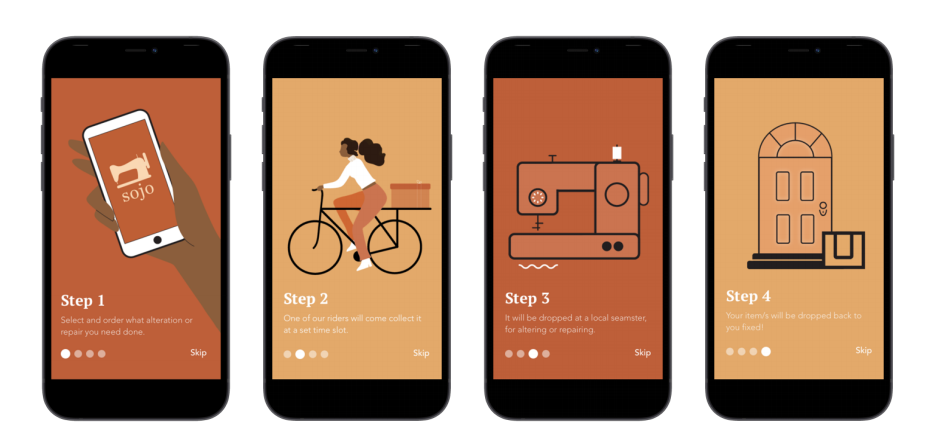Introducing Sojo: the Deliveroo of clothing repairs

Josephine Philips, founder of Sojo
(Josephine Philips)If lockdown boredom has prompted you to finally tackle the mammoth task of sorting out your wardrobe, you may be rediscovering some pre-loved pieces that just don’t quite fit right anymore.
Popping down to the tailor, seamstress or donating to a charity shop isn’t an option at the moment, so you might be tempted to simply chuck that pair of jeans away and find a replacement online. But, in the interest of sustainability (and frugality!), a new app is removing this problem altogether.
The founder, 23-year-old fashion-tech entrepreneur Josephine Philips, has dubbed Sojo the ‘Deliveroo’ of clothing alterations and repairs. The app connects customers with local seamster businesses and bicycle delivery services so that you can get your clothes fixed with a few simple clicks.
The premise is simple: enter your postcode, decide which local seamster looks right for you, select what you need done and a bike courier will cycle to collect your clothes. Sit back, relax and your piece will be returned within five days, ready to wear.
We caught up with Josephine and chatted about her journey creating Sojo.
What inspired you to start Sojo?
Around two years ago now I made a conscious move away from fast fashion because I became aware of how, as an industry, it was exploiting women of colour. I decided to stop supporting brands that had built their successes off a supply chain that violated human rights and in doing so I started finding other ways to consume fashion.
I was a student, so I found that second-hand clothes were the perfect mix of sustainable and affordable. But there was one problem - whether in charity shops, thrift stores or on Depop, I’d constantly find clothes that I loved that weren’t my size. I realised the solution was to alter the clothes to fit me, but I didn’t know how to sew and going to a seamster was too much time and effort. So really it was out of personal need - I wanted something that would make clothing alterations and repairs incredibly easy in that all you’d have to do is book it on your phone and then the rest would be taken care of. And from that Sojo was born!
How does the app work?
When people ask, I usually say ‘Deliveroo’ but for clothing alterations and repairs as it’s a very similar model! Put simply, Sojo connects customers with local seamster businesses through our app and bicycle delivery service so that people can get their clothes altered or repaired with a few simple clicks. You put in your postcode and we show you your local seamsters - with photos, a description and example prices so that you’re able to pick which one you want to use. After that, you input what you need done - for example ‘Trousers, Waist In.’ You can add as many alterations and repairs as you need, then you choose a date and time for us to come and collect your order and voila - we pick it up, fulfil the order, and drop it back to you - fixed!

How have you found starting a business during lockdown?
Starting a business straight out of uni is hard enough already but lockdown has definitely meant it’s been one of the most challenging things I’ve done. We’re a service-based business that relies on actual shops and so we’ve had many seamsters who we’d planned on starting with at the beginning of January who we’ll only be starting with once lockdown is over. Luckily though, a few of our seamsters were open to the idea of our contact free delivery and were happy to try out starting our partnership during lockdown. I’m trying to focus on still moving things forward and the potential silver linings - like the fact that I doubt we’ll have many issues of people not being in when we come to drop off an order which is like hitting a logistics jackpot!
Do you see sustainable fashion as a feminist issue?
100 per cent. My feminism was the reason I stopped supporting fast fashion in the first place. Around 80 per cent of garment workers are women and they are often incredibly underpaid and working in dangerous working conditions. Many face sexual harassment in their workplaces and are unable to unionise or protest. It’s also a race issue because the majority of garment workers are black and brown women - and that is an integral reason as to why this has been allowed to happen and continues to happen.
Do you think there is an accessibility problem within the sustainable fashion sphere?
Accessibility is a huge issue with sustainable fashion because if you’re sourcing your materials in an ethical and environmentally friendly way and paying your workers fairly, the cost of an item does reflect that. However, there are so many ways to be involved with sustainable fashion without having to buy expensive clothing.
I love Venetia La Manna’s #OOOTD (old outfit of the day) movement that is pushing for the fact that the most sustainable clothes are the ones we already own. You can be an integral part of the sustainable fashion movement by just looking after your current wardrobe. I’ve also found that second-hand clothes from vintage sales, charity shops or from Ebay are a really affordable way to shop sustainably.
Where do you see Sojo going in the future?
That’s a hard one to answer because we’re only just getting started but I really hope it becomes an integral and convenient way for people to have a more sustainable wardrobe. I’d love for Sojo to be available all over the UK and internationally too – hopefully making a significant impact in keeping clothes out of landfill and playing a key part in the circular fashion movement.
You can download Sojo from the App Store and check out the community on Instagram @sojo_app.
Read More
Wardrobe surgery: clever ways to breathe life into your old clothes

 Yahoo Sport
Yahoo Sport 





































